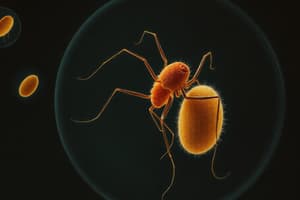Podcast
Questions and Answers
What is the main host of Cryptosporidium spp.?
What is the main host of Cryptosporidium spp.?
- Domestic animals
- Humans (correct)
- Aquatic plants
- Wild animals
Which group of people is most at risk for serious disease due to Cryptosporidium infections?
Which group of people is most at risk for serious disease due to Cryptosporidium infections?
- Elderly individuals
- Immunocompromised patients (correct)
- Healthy adults
- Healthy children
In which part of the intestines do Cryptosporidium spp. infect?
In which part of the intestines do Cryptosporidium spp. infect?
- Muscular layer
- Mucosa
- Villi
- Epithelial cells (correct)
What is the main route of infection by Cryptosporidium parvum?
What is the main route of infection by Cryptosporidium parvum?
Which symptom is NOT commonly associated with Cryptosporidiosis in healthy adults?
Which symptom is NOT commonly associated with Cryptosporidiosis in healthy adults?
What is the main outcome of fertilization in Cryptosporidium parvum?
What is the main outcome of fertilization in Cryptosporidium parvum?
Where do Cryptosporidium parvum oocysts usually appear during fecal wet mount preparation?
Where do Cryptosporidium parvum oocysts usually appear during fecal wet mount preparation?
Study Notes
Eimeria tenella
- Infection occurs through ingestion of food and water contaminated with oocysts.
- Eimeria tenella resides in the intestinal caecum epithelium of chickens, leading to tissue destruction.
- Significant health impacts, particularly in young birds, can lead to high mortality rates.
- Annually, millions of dollars are spent on prevention strategies against Eimeria infections.
Toxoplasmosis
- First identified in 1908 from a desert rodent (Gondi) in Tunis.
- Zoonotic disease with a worldwide presence affecting mammals, birds, and humans.
- Functions as an intracellular parasite targeting muscle, intestinal epithelium, and various tissues.
- Estimated 60 million cases reported in the USA, with the majority being asymptomatic.
- Sporozoites penetrate the intestinal wall, spreading through circulation, and can invade seminal vesicles, causing damage to sperm-forming cells (blastophores).
Monocystis lumbrici
- Characterized by a complex life cycle involving repeated multiple fission, encompassing oocysts, sporozoites, and gametocytes.
- Trophozoites adhere to earthworm sperm tails, highlighting the parasite's presence in earthworm seminal vesicles.
- Sporozoites are integral to the life cycle, allowing for propagation and infection within the host.
Studying That Suits You
Use AI to generate personalized quizzes and flashcards to suit your learning preferences.
Description
Test your knowledge on parasitic protozoa belonging to the phylum Apicomplexa. Learn about Eimeria tenella infection, transmission via oocysts ingestion, and the life cycle involving sporozoites. Challenge yourself with questions related to these parasitic organisms.




